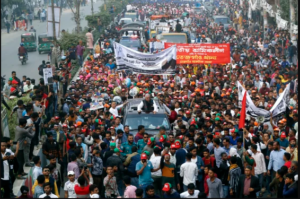Impact-Site-Verification: b44260cb-f973-4d0e-b399-2c5e8eaa992a
Now, let’s turn to Bangladesh. The chorus is growing for Sheikh Hina’s arrest. Courts have already ordered it, yet Hina remains in a safe house in New Delhi. So, what is Dhaka doing about it? Bangladesh is now seeking Interpol’s help. As you may know, Interpol is a global policing organization with around 200 member nations and regions. Bangladesh’s interim regime wants Interpol to step in and issue a Red Notice alert for Sheikh Hina.
What Does a Red Notice Mean?
A Red Notice is essentially a request from Interpol to its member nations: if a suspect is within their borders, they should try to arrest them or have them surrender. In this case, that suspect is Sheikh Hina, a former Bangladeshi leader. A Bangladeshi court has already issued a warrant for her arrest, meaning Interpol can technically step in. However, as this involves a former prime minister, the case has a political dimension, raising uncertainty over whether Interpol will act.
How Will India Respond?
This brings us to India. If a Red Notice is issued, what will New Delhi do? A Red Notice is not an international arrest warrant. Interpol states that member countries can decide how to respond, and India will not be legally bound to act. But the public sentiment in Bangladesh adds pressure. Sunday, November 10th, marked Democracy Day in Bangladesh, a day commemorated since 1987 after protests erupted against a former dictator following the death of an Awami League member—a party associated with Sheikh Hina.
Political Tensions Intensify in Bangladesh
On Democracy Day, the Awami League attempted a rally as a comeback, only to face resistance. Student protesters and BNP (Bangladesh Nationalist Party) supporters flooded the streets. The BNP is led by Khalida Zia, whose party is one of Bangladesh’s largest political groups. Together, they crowded Dhaka, effectively disrupting the Awami League rally. Just days earlier, the BNP had held another rally with a strong message, featuring a woman dressed as Sheikh Hina, locked in a cage.
Political Shifts Under Yunus’s Leadership
In Bangladesh’s shifting political scene, Muhammad Yunus has become a new leader, shaping policy and influence. Yunus’s advisors recently removed the portrait of Sheikh Hina’s father, Sheikh Mujibur Rahman, from the presidential palace. Sheikh Mujib, as he’s known, is not only Hina’s father but also Bangladesh’s founding figure. His portrait’s removal has sparked controversy, with Yunus’s minister labeling Sheikh Mujib a post-1971 “fascist,” an insult that has shocked the nation.
Security Concerns and Human Rights Issues
The security situation in Bangladesh is deteriorating, highlighted by the resignation of the entire Bangladesh Human Rights Commission. Their recent report cited rising violence, mob attacks, and incidents of assault. The resignation of six members, including the chairman, is rumored to be due to pressure from Yunus, whose administration has shown limited tolerance for criticism.
US-Bangladesh Relations Under a Shifting US Presidency
Muhammad Yunus had a political ally in Washington, D.C., with President Joe Biden. However, the recent electoral shift favoring Donald Trump could complicate things. Yunus, a prominent Democrat supporter, had previously contributed to Hillary Clinton’s 2016 campaign. Trump has not forgotten and holds a personal grudge over this, once questioning a Bangladeshi delegation about Yunus’s support for his opponents. Will Trump increase pressure on Yunus, or will he continue Biden’s approach?
India’s Role and Strategic Concerns
India cannot rely solely on US policy to address its interests in Dhaka. India’s approach must be balanced—strong enough to protect its strategic concerns but cautious enough not to push Bangladesh toward closer ties with either China or the US.
